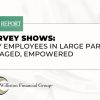

Bernice Ross is the CEO of RealEstateCoach.com.
Social media: Twitter, LinkedIn
What’s your favorite activity outside of work and why?
Two things: I love traveling to other countries, especially if it involves some sort of cruise. When it’s six dollars a minute to make a phone call from the ship, you can really unplug and disconnect.
My husband, Byron, and I are also foodies. We have a group of friends that meet monthly, and they are all superb cooks, as is Byron. We love trying new recipes. I like making desserts (can you say molten chocolate lava cake?) I just can’t indulge that often or nothing will fit.
Approximately how many real estate agents do you coach? How many real estate agents does your business coach?
I can’t give a precise number, since I’m not really a one-to-one coach. Generally, if I’m doing one-to-one work, it is with the leadership in a company about issues they may be having. We have found that most agents who want coaching really come to us for training. The challenge with one-to-one coaching is that it doesn’t scale. To get around that issue, we have done the following.
First, we have put all of our training into a Learning Management System that is available 24-7. Unlike webinars and videos, we built it to be interactive. The 150- to 200-page agent manuals provide the activities and tools that agents need to succeed. Since it is self-paced, agents can get exactly what they need, when they need it. It’s as if I’m there working side by side with the agent, going through the program. Our white labeled new agent sales training programs have already been adopted by two franchises, as well as by the California, Scottsdale and Texas Associations of Realtors. We also have two other state associations considering adoption as well. Our franchise programs have a group coaching program component to support their agents to implement what they learn in the training.
Second, we are launching a new program for 2015 using interactive video training for the Texas Association of Realtors. We will be delivering one hour per month (12 different classes) of continuing education through their two-way broadcast system. This allows the instructor to interact with up to 25 different locations live, all over the state. It’s an exciting new model because the group interacts as if you are in a live session.
Third, my columns seem to show up everywhere — Inman, Banker Tradesman, our own newsletter list, state association magazines, as well as being shared across social media. Most of my columns are coaching-based since they focus on how agents can grow their businesses. Since 2001, I have published more than 1,000 articles and written five books.
Fourth, our daily radio show provides coaching tips for busy agents on the go. The show format is five to seven minutes and plays on the agent’s phone, tablet or computer. We have a guest mentor (usually one of real estate’s leading experts, an agent with innovative ideas, or a top speaker), a training tip to build your business, a working-smarter tip and a thought for the day. Our Monday shows are free — we have a small subscription fee for the Tuesday through Friday shows.
Do you measure the average ROI of your clients? If so, what is it, and how exactly do you measure it?
Because of the nature of our current business, we’re not able to really track ROI. When we do work with a one-to-one client, they generally see a 25-50 percent increase in their income, provided they stay with the process for at least 6-12 months. Our goal is to build long-term, sustainable change — not to create a flurry of activity that the agent will eventually quit doing.
Do you think some holidays are kind of annoying? If so, why? If not, why?
Before I went through my coach training (and was coached by four different coaches on this issue), my answer would have been, “What holidays?” I was working all the time since I was selling real estate full time (and later running a training program for the 4,000-agent Jon Douglas Company) as well as having a full time position at Pierce College teaching psychology and statistics. I’m much better about taking holidays now, especially since we do our best to spend them with family and friends.
Different people have different needs, but what specific business strategies do you seem to find yourself recommending most often to real estate agents?
I keep coming back to two specific things: First, look at your production and determine your strengths based upon your numbers. Identify not only the location but also the type of clients you are attracting in as much detail as possible. Build your business niche around these specific strengths. It’s the best way to achieve an online presence as well as to attract clients in the areas where you have the most expertise.
I also love helping our clients understand how “attraction” works. It’s quite remarkable. The first time I trained it back in 1996, the agents looked at me as if I had just landed from Mars. Nevertheless, year after year, this has worked for me personally as well as our clients. The six steps are:
1. You attract who you are — your clients and friends are mirrors that reflect what’s best about you as well as areas where you may need to grow.
2. Create space – you can’t attract new business if you don’t have space to handle it. Clean your garage, your closet, your desk – it makes no difference where you start. It sounds weird, but it works.
3. Have clarity about who you want to attract — this means an ideal client list that is at least one page, single spaced, in length.
4. Visualize yourself achieving your goals — if you want a new car, go drive one at the dealership, take a photo, and put it where you will see it everyday.
5. Give back — when you help others, your business grows.
6. The attitude is gratitude — we have so much we have to be grateful for in our lives: abundant food, clean water, housing, friends, family. It’s easy to chase having things — I’ve done it — it doesn’t lead to happiness. The secret is serving others and being grateful for what you have.
What are some common hangups or weaknesses that keep real estate agents from realizing their full potential?
1. Mindset – I can’t tell you how many times I have invited a top-producing agent to reach for a goal that is 50-100 percent higher than what they currently earn, and the first words I hear are, “I could never do that!” The reason is that the agents believe that they will have to work harder. If they implement the right tools and systems, focus on the strengths, and take time off, most can hit that goal and actually work less!
2. “Shiny Object Syndrome” coupled with the pursuit of the “silver bullet.” Agents keep searching for a new way to build their businesses – the truth is the same as it has always been. Your job comes down to six words: generate leads, convert leads, close transactions.
3. Get out of the box. As one of our coaches once said, “You have to take the training out of the box and use it!”
How do you address those hangups or weaknesses through coaching?
Every client’s path is different. Again, it’s a matter of discovering their strengths and expanding them. This also means using technology to simplify and streamline what they already do and to delegate where appropriate.
How much does the average client pay your business for coaching every month?
This depends upon the nature of the work we’re doing. I’ve done pro-bono coaching (and still do) for the women who attend our AFIRE leadership conference – that’s part of my commitment to being of service. If one of them is going through a business or personal issue, I’m the person there supporting them through that difficult journey. One-to-one coaching rates for our team can range from $400 to $1,000 per month. Our corporate rates can run several thousand dollars a month depending upon the scope of the project.
What’s the biggest obstacle you’ve faced in growing your business, and how have you tried to overcome it?
Like most other businesses, the recession hit us very hard – cash flow can be an issue, especially when I had six surgeries in 12 months back in 2010-2011. We’re looking at our new online learning programs and the live, interactive video broadcasts as a prime focus for 2015. The fact that technology makes our programs more accessible and scalable is a prime reason we’re moving in this direction.
What do you do when you want to relax?
I love a good mystery novel, am semi-addicted to Scrabble and am a 1930s movie buff. Eating Byron’s cooking, however, is at the top of the list.
Do you think coaching is more popular in real estate than in other sales industries? If so, why? If not, why?
The real estate industry has lumped coaching, consulting, training and mentoring into the term “coaching.” So by that standard, it’s something that is very popular. The number of agents who have actually hired a one-to-one coach is relatively small – my guess is less than 10,000. Given that 2 million people hold licenses, that’s not very many. In the corporate world, most big companies have internal coaches. I just don’t have any basis for making a comparison.
Have you ever been a real estate agent?
Yes – I actively sold for 20 years and have had a California broker license since 1982.
Do your coaches typically have coaches themselves? If not, why?
Most coaches are coached. Since I live with a master certified coach, we sometimes have to declare “a coach free zone.” Nevertheless, when I’m facing a business problem or other issue I am having challenges with, talking with my coach or mentor is the first step I take.
How should real estate agents measure success?
Every person’s yardstick for success is different. Some of the standards I look for include:
1. Are you happy?
2. Do you love what you do?
3. Do you have a great personal life as well as a great business?
4. Where are you contributing to others?
5. Are you grateful for what you have?
Would you like to participate in our real estate coach profile series? Email contributors@inman.com!
The post Bernice Ross: ‘The secret is serving others and being grateful for what you have’ appeared first on WFG National Title Insurance Company.







